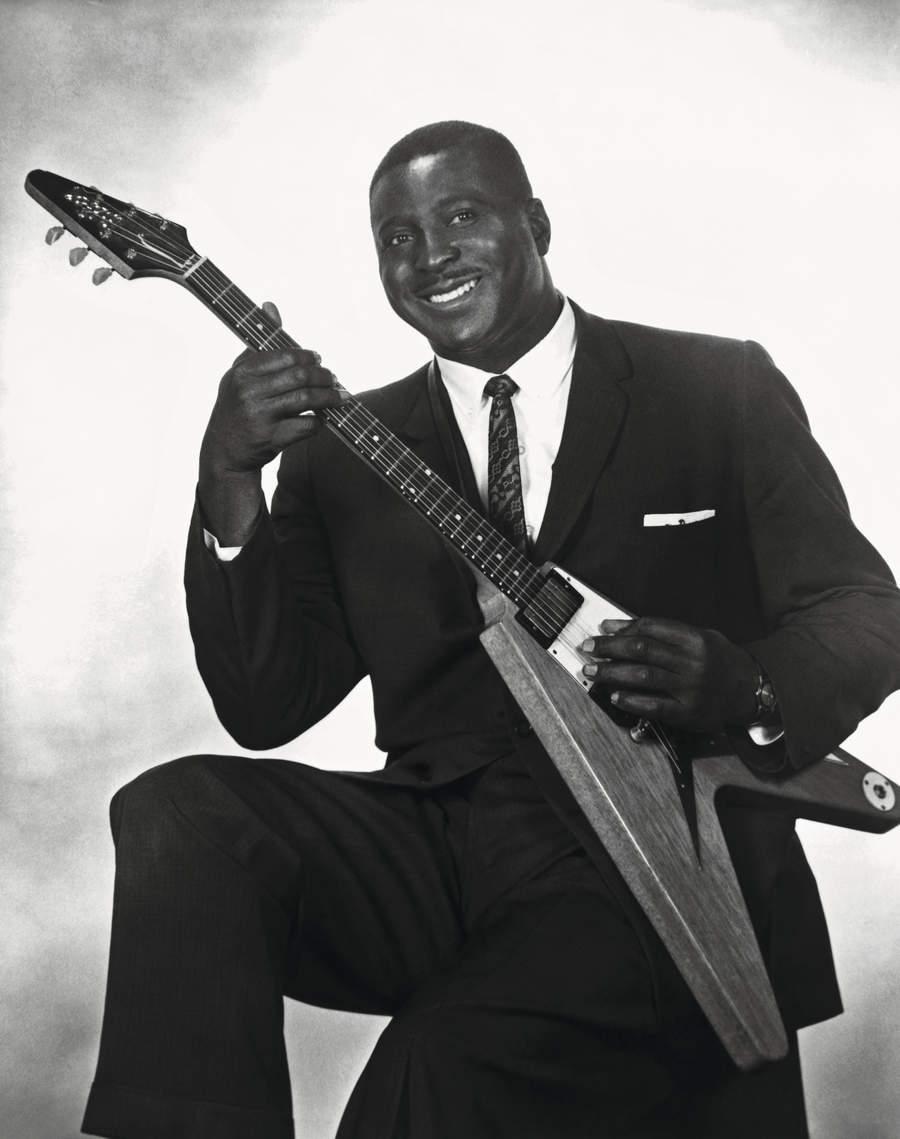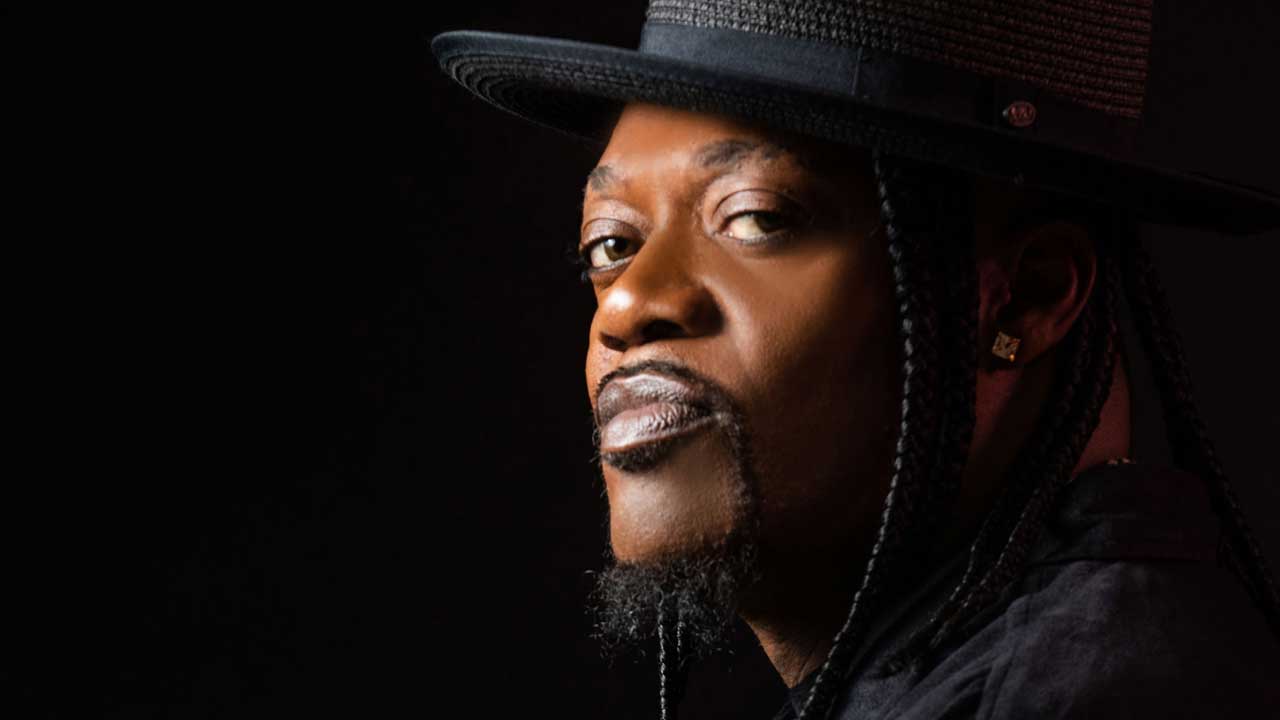Most great blues albums are born out of hardship and turbulence. Crown, the so-far career-best new record by Eric Gales, is no different. In the run-up to its release, both he and his wife and manager, LaDonna, were hospitalised with covid – a terrifying and lonely experience in which they said their last goodbyes, fearing the worst. The blues community rallied, sending support of a spiritual and financial nature, and mercifully the pair made it through.
“I’ve never forgotten that prayers were being sent our way,” a healthy-looking – if tired from a day of interviews – Gales says today, sitting in a room in his North Carolina home stacked high with guitars, as his huge, handsome cat Blue looks on impassively. “Because it was tough.”
Not everyone was so fortunate. The thank-you list on his new record speaks of loss, most recently of his father, and as Gales chats, a photograph of his family – his parents and his four brothers – gazes down on him. What they see is a survivor. But his grief is clearly still raw.
“Man, I gotta tell you that it is still devastating,” he says. “There was seven of us to start out with, and four of them are gone. But I rest in knowing that my father, before he passed away, he saw me clean and sober. And my dad told me: ‘Son, I’m proud of you, and don’t you ever forget that.’ So that is something that I take with me, that my father did not leave here with me being in a bad state.
"I can’t say the same about my mom. My mom saw me in active addiction. The only way that I don’t beat myself up about it is I tried to make today a little bit better than yesterday. And I know that my mom is looking down as well as my two brothers that passed away. I know that they’re looking and smiling, just like they’re doing in these pictures that I’m looking at now."

Born in Memphis, Tennessee into a family full of musicians – Eric was the youngest of five boys – to a stay-at-home mother and a truck-driver father, a sense of working hard and doing the right thing was instilled in him from a young age. He first picked up an instrument when he was six or seven, joining in as grand family gatherings full of aunties, uncles and cousins inevitably led to the whole clan singing and playing along together, steeped in the gospel music of their church.
At school he was a typical kid, and threw himself into his role of drummer in its marching band. But possibly most pertinent, and least tangible, was the influence of Memphis itself.
“There’s a lot of history there,” he says. “Per capita, that is one of the most hit-making towns. Anybody and everybody definitely made a trip through Memphis and left some DNA and a fingerprint there. And, you know, I just soaked up as much as I could.”
At the age of 11 he even met his hero, blues great Albert King, at the local fish market – a humble setting for such an informative moment.
“Albert King, his playing had so much depth to it, man,” Gales says, still a fan all these years later. “Meeting him was one of the coolest things ever. I think that might have been the first famous person that I met that was truly an inspiration to me. And I’ll never forget it, it touched my life. He was a big guy. So this big giant pulled up. I said: ‘Wow, that’s Albert King.’ It blew my mind. I don’t remember what I said to him, I just know that I was in awe."

“I was just being me,” he says. “Then all of a sudden I noticed that the world was taking a real liking to what was happening. I had no intention of being famously known for what I do. It just so happened to happen. I don’t regret it, I really don’t. The things that came forward in my life and things that I’ve been privileged to do, and accomplishments and things of this nature, I’m very proud of them. Having that attention at a young age was exhilarating.”
Gales toured the world, worked with heroes such as Stevie Ray Vaughan, and amassed a passionate following. And then, famously, the wheels came off in spectacular style. His three-decade struggle with substance abuse – he fell headlong into a relationship with cocaine that led to time in prison on drugs and firearm charges – has been well-documented in this magazine. It was, he says, “a series of bad decisions that led to a string of bad decisions for about thirty years, and it’s miraculous that I survived”.

Crown is the sound of a man – often hailed by his peers as the greatest guitarist of his generation – reclaiming his legacy from his own troubled past, and taking a swipe at the wider world along the way. The album was produced by Joe Bonamassa, his friend of 30 years, whose own precocious rise to stardom ran in parallel to Gales’s. Working on Crown, the duo spent hours in the studio, crafting the new songs, agonising over distortion pedals and the search for the right tone, then headed off to dinner together at the end of the day.
“We are so different as people, but it gels,” Gales says. “We are different characters, but when we come together, man, we come together as one.”
Gales’s scorching solo on the track I Want My Crown is a testament to that partnership. Lyrically it finds him furiously reclaiming those wilderness years, making up for lost time and staking his claim as one of the modern-blues greats.
Is there an element in the song of him being envious of his peers’ success while he was languishing in jail?
“I kind of was, but it was my own fault,” he admits. “Nobody was holding me back but me. I think that [song] was a kind of a self-revelation conversation to myself. ‘You know what? You deserve a crown. You’ve been through the pain, and you’ve been through the dark trenches, and now you’re here alive as a phoenix rising above the ashes. You deserve your seat at the head of the table. It’s your time, it’s your turn.’ Joe basically initiated this. He said: ‘Eric, it’s time for you to get your crown, man. You’ve been here, now you need your proper due.’”
It’s not just the personal that feeds into Crown, though. The day before Gales and Bonamassa went into the studio for the first day of work, 46-year-old George Floyd was murdered by a white police officer in Minneapolis, sparking worldwide outrage and protests, and mobilising the Black Likes Matter movement.
That event had a profound effect on the deeply unsettled Gales, and there’s a fury to Crown songs such as Too Close To The Fire, which evokes the racist Mississippi Burning murders of 1964, making clear parallels to current events. It’s searing social commentary, but it is not, according to Gales, a political record.
“Actually, there’s nothing about me that’s political,” he says. “I don’t like politics at all. Because I think that is what has created a lot of the divide. Every night [at my shows] there is a combination of many races, colours, creeds, ethnicities, sexual preferences, all in one room at the same time with no problem. That’s happening by the pure love of music, and enjoyment and inspiration and positive swapping of energy.
"If we got rid of all of this damn political shit, we might be able to come together also. But there are some things that I made reference to on these songs that I don’t think the listeners may be aware of. And if it’s enough to make them say: ‘Huh, he just talked about something that I don’t know nothing about. Is this real?’
"If my way of putting a reference to an incident that happened in this world as an injustice to any culture, any race, any creed, any colour of any kind gives them a little bit of knowledge about what happened that they had not known before, then I think there was a point well proven.”
Similarly, The Storm asks the listener to check their own motivations. It was sparked by Fox TV host Laura Ingraham’s “very, very disrespectful” suggestion that LA Lakers basketball player LeBron James should “shut up and dribble” rather than taking the knee in peaceful protest. Gales hit out on social media in support of James.
“Someone then made a statement to me to just shut up and play. And that’s the last thing that you want to tell somebody,” he says. “The Storm puts people in check. Ask that question to yourself: ‘Do I like what this guy played, but I don’t like him?’ That’s a real situation. It’s just sad that that’s a cancer that is so difficult to be cut out when there’s an easy solution. Allow someone an opportunity to make you hate them before you actually hate them.
"Then you might find out you don’t hate him at all. I felt like now’s the time, more than ever, for me to speak about experiences from my life, because I want the listeners to understand that I’m not preaching to you, and I’m not trying to force this down your throat. All I’m simply trying to do is have a conversation with the people that listen to this record, and I hope they accept it as such.”
Fired up and with the album of a lifetime – and a specific moment in time – under his belt, Eric Gales has a busy year ahead. As we wrap up our conversation, he’s heading off to pack for the first tour of the year. Looking ahead from the tough times to today’s triumph, there’s just one more question: what does he still have to prove? Gales beams and laughs deeply, at ease with his place in the world. “Not a damn thing.”
Crown is out now via Provogue.

